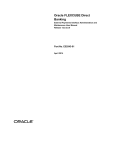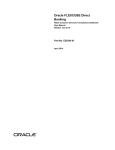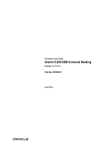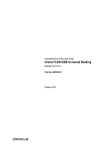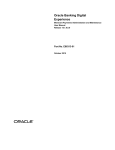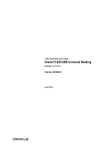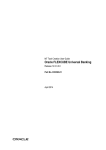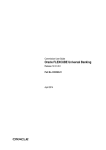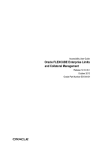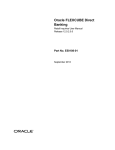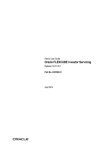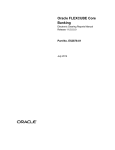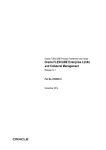Download Salary Processing User Manual
Transcript
Salary Processing User Guide Oracle FLEXCUBE Universal Banking Release 12.0.3.0.0 Part No. E53393-01 April 2014 Salary Processing User Guide April 2014 Oracle Financial Services Software Limited Oracle Park Off Western Express Highway Goregaon (East) Mumbai, Maharashtra 400 063 India Worldwide Inquiries: Phone: +91 22 6718 3000 Fax:+91 22 6718 3001 www.oracle.com/financialservices/ Copyright © 2007, 2014, Oracle and/or its affiliates. All rights reserved. Oracle and Java are registered trademarks of Oracle and/or its affiliates. Other names may be trademarks of their respective owners. U.S. GOVERNMENT END USERS: Oracle programs, including any operating system, integrated software, any programs installed on the hardware, and/or documentation, delivered to U.S. Government end users are "commercial computer software" pursuant to the applicable Federal Acquisition Regulation and agency-specific supplemental regulations. As such, use, duplication, disclosure, modification, and adaptation of the programs, including any operating system, integrated software, any programs installed on the hardware, and/or documentation, shall be subject to license terms and license restrictions applicable to the programs. No other rights are granted to the U.S. Government. This software or hardware is developed for general use in a variety of information management applications. It is not developed or intended for use in any inherently dangerous applications, including applications that may create a risk of personal injury. If you use this software or hardware in dangerous applications, then you shall be responsible to take all appropriate failsafe, backup, redundancy, and other measures to ensure its safe use. Oracle Corporation and its affiliates disclaim any liability for any damages caused by use of this software or hardware in dangerous applications. This software and related documentation are provided under a license agreement containing restrictions on use and disclosure and are protected by intellectual property laws. Except as expressly permitted in your license agreement or allowed by law, you may not use, copy, reproduce, translate, broadcast, modify, license, transmit, distribute, exhibit, perform, publish or display any part, in any form, or by any means. Reverse engineering, disassembly, or decompilation of this software, unless required by law for interoperability, is prohibited. The information contained herein is subject to change without notice and is not warranted to be error-free. If you find any errors, please report them to us in writing. This software or hardware and documentation may provide access to or information on content, products and services from third parties. Oracle Corporation and its affiliates are not responsible for and expressly disclaim all warranties of any kind with respect to third-party content, products, and services. Oracle Corporation and its affiliates will not be responsible for any loss, costs, or damages incurred due to your access to or use of third-party content, products, or services. Contents 1. Preface ...................................................................................................... 1-1 1.1 1.2 1.3 1.4 1.5 1.6 2. 2.5 2.6 Introduction.............................................................................................................. Maintaining Employer Details .................................................................................. Maintaining Employee Details ................................................................................. Payment of Loan through Salaries .......................................................................... 2.4.1 Specifying Loan Details .............................................................................. 2.4.2 Changing the Salary Amount for an Employee for the Current Period ....... Processing Salaries for the Day .............................................................................. Viewing Details of Salaries Processed .................................................................... 2-1 2-1 2-2 2-3 2-4 2-5 2-6 2-8 Reports ..................................................................................................... 3-1 3.1 3.2 3.3 4. 1-1 1-1 1-1 1-1 1-2 1-2 Processing Salaries ................................................................................ 2-1 2.1 2.2 2.3 2.4 3. Introduction.............................................................................................................. Audience.................................................................................................................. Documentation Accessibility.................................................................................... Organization ............................................................................................................ Related Documents ................................................................................................. Glossary of Icons..................................................................................................... Introduction.............................................................................................................. 3-1 Processed Salary Report......................................................................................... 3-1 Unprocessed Salary Report .................................................................................... 3-3 Function ID Glossary ............................................................................... 4-1 1. Preface 1.1 Introduction This manual is designed to help you to quickly get familiar with the Salary Processing module of Oracle FLEXCUBE. It takes you through the various stages in processing a Payments or Collections transaction. You can further obtain information specific to a particular field by placing the cursor on the relevant field and striking <F1> on the keyboard. 1.2 Audience This manual is intended for the following User/User Roles: 1.3 Role Function Back Office Trade Finance Department Clerks PC Contract Input functions except Authorization. Back Office Trade Finance Department Officers PC Contract Authorization, maintenance of static data specific to the BC module Front end Trade Finance Product Managers PC Product definition functions excluding authorization. BC Report/Query functions End of Day Operators End and beginning of day related processing functions. PC Report/Query functions. Bank’s Financial Controller/ Trade Finance Department Manager Branch level processing related setup for PC module and Authorization of the same Authorization of PC product definitions/amendments PC Report/Query functions MIS Department Officers PC Query/Report functions Documentation Accessibility For information about Oracle's commitment to accessibility, visit the Oracle Accessibility Program website at http://www.oracle.com/pls/topic/lookup?ctx=acc&id=docacc. 1.4 Organization This manual is organized into the following chapters: Chapter 1 Preface gives information on the intended audience. It also lists the various chapters covered in this User Manual. Chapter 2 Processing Salaries explains how salaries are processed in this module. Gives information on basic information that needs to be maintained in the system before beginning operations for salary processing Chapter 3 Reports lists the possible reports that can be generated for the Module. 1-1 Function ID Glossary has alphabetical listing of Function/Screen ID's used in the module with page references for quick navigation. Chapter 4 1.5 Related Documents You may need to refer to any or all of the User Manuals while working on the SP module: 1.6 Procedures Products User Defined Fields Glossary of Icons This User Manual may refer to all or some of the following icons: Icons Function Exit Add row Delete row Option List 1-2 2. Processing Salaries 2.1 Introduction Salary processing may be one of the significant services you offer your corporate clients. Done manually, this could be a rather prolonged and strenuous task—debiting a specific account of the specified amount and crediting the numerous employee accounts with an appropriate amount, as instructed by your client. The Salary Processing (SL) facility of Oracle FLEXCUBE significantly automates salary processing. This means, salary processing is remarkably quick and error-free. To begin automatic processing of salaries, you need to set up the following: Maintaining Employer details Maintaining Employee details Maintaining Salary Processing Details Making changes to the salary to be paid to an employee, if required Execution of the Salary Processing batch process This chapter explains how you set up reference information that will be used for salary processing. You will also need to maintain a product category in the Payments and Collection module, which will be used for processing salary payments to employees. For details about maintaining product categories, refer the chapter titled ‘Maintaining information specific to the Payments and Collections module’ in Payments and Collections user manual. 2.2 Maintaining Employer Details To offer salary processing facilities to a corporate customer using Oracle FLEXCUBE, You can maintain this information in the ‘Employer Maintenance’ screen invoked by typing 2-1 ‘SLDEMPLR’ in the field at the top right corner of the Application tool bar and clicking the adjoining arrow button. For an employer, you have to specify the following information: 2.3 The Branch at which you are maintaining the information The Branch at which the employer maintains the salary account The PC Product Category used for salary processing. This must be an outgoing payment category. The Employer (this would be a valid CIF ID) The Employer Account (this would be a valid CASA account) The Start Date and Start Month the Frequency at which the salary is to be paid (On the basis of the start date and the frequency you indicate, the salary for the employees of the company will be credited to their respective accounts.) The external employer identification number for the employer The frequency at which the employer pays a salary (monthly, quarterly, etc.) Maintaining Employee Details Once you have maintained Employer details, you have to maintain salary information for the employees working for the employer. You can maintain this information in the ‘Employee Maintenance’ screen invoked from the Application Browser. You can also invoke this screen 2-2 by typing ‘SLDEMPLY’ in the field at the top right corner of the Application tool bar and clicking the adjoining arrow button. For each employee working for an employer, you have to specify: 2.4 The branch at which you are maintaining details The employer for whom the employee works (the CIF ID of the employer) The Account holder check box is enabled only if the employee has an Oracle FLEXCUBE account Employee to whom he is working The CIF ID of the Employee and the ID that identifies the employee with the employer The Bank at which the employee holds the salary account The status of the employee account (whether closed, active or ‘on hold’) The branch at which the employee maintains the salary account The account of the Employee in Oracle FLEXCUBE (in case Account holder check box is enabled) The external employee identification number of the employee account The name of the employee for whom the salary is to be credited The default salary to be credited to the employee account (Unless modified, this is the salary that the system posts to the employee account at every salary cycle.) The currency in which the salary is to be paid to the employee The maximum payment limit amount for the employee Changing the Salary Amount for an Employee for the Current Period In the ‘Employee Details Maintenance’ screen, the default salary that is to be paid to an employee is specified. This is the salary that will be credited to the employee’s account, by default, on every salary payment date. On occasion, however, the salary that is payable to an employee may be more or less than the default amount specified. In the Salary Details for ‘Current Period’ screen, for a due date, you can indicate the salary amount that should 2-3 actually be credited to an employee only for that period. After the current period, the default salary maintenance in the employee screen will be considered. This screen is invoked by typing ‘SLDSALCP’ in the field at the top right corner of the Application tool bar and clicking the adjoining arrow button. To specify the salary amount for the current period that should be paid to an employee, you have to capture the following information: The Branch (Code) where the employer maintains the salary account Employer to whom an employee is working The CIF IDs of the employer and employee Employee Branch The Account holder check box is enabled only if the employee has an Oracle FLEXCUBE account The Employee details The Salary amount The currency in which the salary is to be paid Once you have captured this information, enter the salary amount that should be credited to the employee’s account on the current payment due date. When you execute the salary process for the current period, the amount you specify here will be credited to the employee’s salary account. 2.5 Processing Salaries for the Day Based on the salary details that you have maintained for your clients, salary is processed either at the beginning of day (BOD) or during end of day (EOD) marking. This maintenance is done from the Mandatory Batch Program Maintenance screen invoked by typing 2-4 ‘EIDMANPE’ in the field at the top right corner of the Application tool bar and clicking the adjoining arrow button. The Salary Batch process posts the debit and credit entries to the respective accounts. You can opt to execute the Salary Batch Process: Only for the current system date For the holidays that fall between the current system date and the next working day. 2-5 This maintenance is done from the BATCH EOD Function Input screen, this screen is invoked by typing ‘BADEODFE’ in the field at the top right corner of the Application tool bar and clicking the adjoining arrow button. If you execute the salary process at EOD, you can opt to process salaries that are due upto the next working day. This is achieved by choosing the Next Working Day-1 option. Note that this option is enabled only if the salary process is marked for EOD. 2.6 Viewing Details of Salaries Processed You can view the details of the salaries that have been processed in the ‘Salary Log’ screen. This screen can be invoked from the Application Browser by typing ‘SLDSALLG’ in the field at the top right corner of the Application tool bar and clicking the adjoining arrow button. 2-6 You can view the salary details along the following criteria: Branch Product Category used for salary processing. Salary Date Transaction Reference Processing Date Employer and Employer Customer Identification File Employer and Employers Account Employers Account Currency Salary Amount Salary Currency Salary Amount Employer Currency Exchange Rate Employer Employee Exchange Rate Salary Employer Employee Customer Identification File Employees Account Employee Account Branch Employee Account Currency Click ‘Entries’ button to view the accounting entries passed by the Salary Process. The screen is shown below: Click on Accounting Entries Button to view the Accounting Entries maintained for the PC Product. 2-7 3. Reports 3.1 Introduction During the day, or at the end of the day, you may want to retrieve information on any of the several operations that were performed during the day in your bank. You can generate this information in the form of reports in Oracle FLEXCUBE. This chapter deals with the reports that you can generate for Salary Processing module. 3.2 Processed Salary Report You can generate salary report using ‘Processed Salary Report’ screen. You can invoke this screen by typing ‘CORPRSAL’ in the field at the top right corner of the Application tool bar and clicking on the adjoining arrow button. Branch Code You can generate this report for all the branches or a single branch alone. You can indicate the branch for which the report is being generated using the following options: All – If you choose this, the system will generate the report for all the branches. Single – If you choose this, you need to specify the branch code for which the report should be generated. The option list displays all valid branch codes maintained in the system. Choose the appropriate one. Report Date Specify the date of report from the adjoining calendar. Contents of the Report The parameters specified while generating the report are printed at the beginning of the report. Other content displayed in the report is as follows: 3-1 Header The following details are displayed in the header section: Field Name Field Description Report Name Indicates Report Name Branch Code / Branch Name Indicates Current Branch code and Branch Name User ID Indicates the Identification of the User Module Indicates the Module of the Report Report Run Date Indicates Current Branch Date Report Run Time Indicates Current Branch Time Branch Date Indicates the date of Branch in which report is taken. Page No Displays Page No out of total No of pages in report. Body of the Report The following details are displayed as body of the generated report: Field Name Field Description Branch Indicates the current branch code Processed Date Indicates the processed date Transaction Reference Number Indicates the transaction reference number Salary Date Indicates the salary date Employer Indicates the name of the employer Employee Indicates the employee name Employee Account Indicates the employee account Salary Amount Indicates the salary account CCY Indicates the currency of the transaction 3-2 3.3 Unprocessed Salary Report You can generate salary report using ‘Unprocessed Salary Report’ screen. You can invoke this screen by typing ‘CORUNPSL’ in the field at the top right corner of the Application tool bar and clicking on the adjoining arrow button. Branch Code You can generate this report for all the branches or a single branch alone. You can indicate the branch for which the report is being generated using the following options: All – If you choose this, the system will generate the report for all the branches. Single – If you choose this, you need to specify the branch code for which the report should be generated. The option list displays all valid branch codes maintained in the system. Choose the appropriate one. Report Date Specify the date of report from the adjoining calendar. Contents of the Report The parameters specified while generating the report are printed at the beginning of the report. Other content displayed in the report is as follows: Header The following details are displayed in the header section: Field Name Field Description Report Name Indicates Report Name Branch Code / Branch Name Indicates Current Branch code and Branch Name User ID Indicates the Identification of the User Module Indicates the Module of the Report Report Run Date Indicates Current Branch Date Report Run Time Indicates Current Branch Time 3-3 Branch Date Indicates the date of Branch in which report is taken. Page No Displays Page No out of total No of pages in report. Body of the Report The following details are displayed as body of the generated report: Field Name Field Description Branch Indicates the current branch code Employer Indicates the name of the employer Employee Indicates the employee name Employee Account Indicates the employee account Salary Date Indicates the date of the salary Salary Amount Indicates the salary account Transaction Reference Number Indicates the transaction reference number Bank Code Indicates the bank code Error Description Indicates the error description 3-4 4. Function ID Glossary B E BADEODFN ......................... 2-7 EIDMANPR .......................... 2-6 C S CORPRSAL .......................... 3-1 CORUNPSL ......................... 3-3 SLDEMPLR .......................... 2-2 SLDEMPLY .......................... 2-3 SLDSALCP ........................... 2-5 SLDSALLG ........................... 2-8 4-1

















